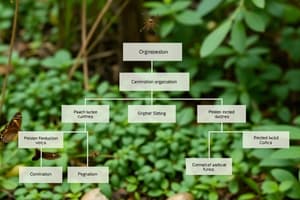Podcast
Questions and Answers
What is the primary focus of botany?
What is the primary focus of botany?
- Study of animals and their behavior
- Study of cellular structures
- Study of plant physiology and genetics (correct)
- Study of microorganisms and their environment
What does the cell theory state?
What does the cell theory state?
- All cells can perform photosynthesis
- All living organisms are composed of cells (correct)
- Cells are only found in multicellular organisms
- Cells can survive independently of one another
Which process involves the synthesis of foods using sunlight?
Which process involves the synthesis of foods using sunlight?
- Fermentation
- Metabolism
- Respiration
- Photosynthesis (correct)
In which level of biological organization do groups of similar cells perform a specific function?
In which level of biological organization do groups of similar cells perform a specific function?
Which of the following is NOT a major branch of biology?
Which of the following is NOT a major branch of biology?
What is metabolism defined as?
What is metabolism defined as?
What do genetic codes determine?
What do genetic codes determine?
Which branch of biology focuses on the interactions between organisms and their environment?
Which branch of biology focuses on the interactions between organisms and their environment?
Flashcards are hidden until you start studying
Study Notes
Overview of Biology
- Biology is the scientific study of life and living organisms.
- It examines their structure, function, growth, origin, evolution, and distribution.
Major Branches of Biology
- Botany: Study of plants, including their physiology, structure, genetics, ecology, and evolution.
- Zoology: Study of animals, their behavior, physiology, classification, and distribution.
- Microbiology: Study of microorganisms, including bacteria, viruses, fungi, and protozoa.
- Cell Biology: Focuses on the structure and function of cells, the basic unit of life.
- Genetics: Study of heredity and variation in organisms, including DNA structure and function.
- Ecology: Study of interactions among organisms and their environment.
- Evolutionary Biology: Study of the origins and changes in the diversity of life over time.
Fundamental Concepts
- Cell Theory: All living organisms are composed of cells; the cell is the basic unit of life.
- Homeostasis: The ability of an organism to maintain a stable internal environment.
- Evolution: Change in the heritable traits of biological populations over successive generations.
- Genetic Code: The set of rules by which information encoded in genetic material is translated into proteins.
Levels of Biological Organization
- Molecular Level: DNA, RNA, proteins, lipids, carbohydrates.
- Cellular Level: Prokaryotic and eukaryotic cells.
- Tissue Level: Groups of similar cells performing a specific function.
- Organ Level: Structures composed of different tissues working together.
- Organ System Level: Groups of organs that work together to perform complex functions.
- Organism Level: Individual living entities.
- Population Level: Groups of the same species in a given area.
- Community Level: Interactions between different populations in a specific area.
- Ecosystem Level: Communities plus their physical environment.
- Biosphere Level: Global sum of all ecosystems.
Biological Processes
- Metabolism: The set of life-sustaining biochemical reactions, including catabolism (breaking down) and anabolism (building up).
- Photosynthesis: Process by which green plants and some other organisms use sunlight to synthesize foods from carbon dioxide and water.
- Respiration: The process of breaking down glucose to produce energy in the form of ATP.
Importance of Biology
- Understanding of fundamental life processes.
- Development of medical advancements and treatments.
- Conservation of biodiversity and ecosystems.
- Insight into agricultural practices and food production.
Overview of Biology
- Biology explores life and living organisms, focusing on structure, function, growth, origin, evolution, and distribution.
Major Branches of Biology
- Botany: Investigates plant physiology, structure, genetics, ecology, and evolutionary processes.
- Zoology: Examines animal behavior, physiology, classification, and distribution patterns.
- Microbiology: Studies microscopic organisms such as bacteria, viruses, fungi, and protozoa.
- Cell Biology: Analyzes the structure and function of cells, recognized as the fundamental unit of life.
- Genetics: Focuses on heredity, variation in organisms, and the structure and function of DNA.
- Ecology: Explores interactions among organisms and between organisms and their environment.
- Evolutionary Biology: Investigates the origins of life and variations over time within biological diversity.
Fundamental Concepts
- Cell Theory: Asserts all living beings are made up of cells, which serve as the basic life unit.
- Homeostasis: Describes the ability of organisms to maintain a stable internal environment despite external changes.
- Evolution: Represents the variation of traits within populations across generations leading to adaptation.
- Genetic Code: Refers to the rules that dictate how genetic information is converted into functional proteins.
Levels of Biological Organization
- Molecular Level: Comprises organic molecules such as DNA, RNA, proteins, lipids, and carbohydrates.
- Cellular Level: Differentiates between prokaryotic and eukaryotic cell types.
- Tissue Level: Groups similar cells performing designated functions.
- Organ Level: Involves structures formed by distinct tissues collaborating.
- Organ System Level: Consists of interconnected organs working toward complex functions.
- Organism Level: Individual entities categorized as living beings.
- Population Level: Groups sharing the same species within a specific area.
- Community Level: Interrelationships among various populations inhabiting an environment.
- Ecosystem Level: Integrates communities with their physical surroundings.
- Biosphere Level: Encompasses the entirety of global ecosystems.
Biological Processes
- Metabolism: Encompasses all biochemical reactions vital for life, including catabolism (breakdown) and anabolism (synthesis).
- Photosynthesis: Enables green plants to convert sunlight, carbon dioxide, and water into nutrients.
- Respiration: Process by which glucose is degraded to generate energy stored as ATP.
Importance of Biology
- Provides insight into critical life processes and mechanisms.
- Drives advancements in medicine, enhancing treatment capabilities.
- Aids in the preservation of biodiversity and natural ecosystems.
- Informs practices related to agriculture and food production.
Studying That Suits You
Use AI to generate personalized quizzes and flashcards to suit your learning preferences.




